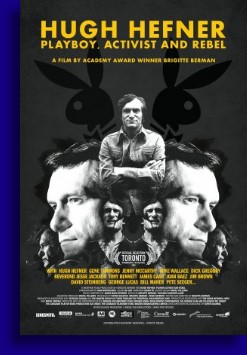


Reviewed by
Christopher Armstead


My main man Gene Simmons opens this ‘documentary’ about Hugh Hefner making the bold statement that there’s not a man on the planet earth who wouldn’t want to be Hugh Hefner. Gene… Dr. Love… That’s not entirely true. You see I’m watching an eighty-four year old man who can’t sleep, is surrounded by a bevy of plastic blondes in addition to other sycophants and largely narrates his own story by informing me of all the great things he’s done in his life. As if he’s trying to convince me of something. I’m not envying that at all Dr. Love. Now if somehow I got an invitation to the Playboy Mansion there’s no way in hell I’d be turning it down since I’d have absolutely no problem with being a sycophant for a day, but that’s something else altogether. Another thing I’m not envying all that much is Brigite Berman’s documentary ‘Hugh Hefner: Playboy, Activist, Rebel’ because I went into film thinking I was going to get an honest examination of the life of one the more incredible figures of the twentieth century but came out of this film with the feeling I just saw Mr. Hefner get a two hour neck massage.
It’s not that ‘Playboy, Activist, Rebel’ wasn’t engrossing or interesting to watch, beginning with Mr. Hefner touching on briefly, and we do mean briefly, about his puritanical upbringing as a child and his frustrations with the repression and the expectations of a life he didn’t want. The thing about this is that the old grainy black and white family photo was full of people, people I wouldn’t mind knowing something about. What kind of relation did Hefner have with his family? His parents? What did his parents think about their son starting a nudie mag? Were they happy? Sad? Tell him he’s burning in eternal flames or did dad pat him on the back and say ‘That’s my boy?’ That’s obviously fodder for another movie because it ain’t here. We can assume he has a great relationship with his brother Keith since he often pops up as one of the talking heads massaging his brother, but even this isn’t explicitly stated in any form.
Moving on, Hef graduates from Northwestern, marries, has a kid but he’s miserable at his job at the children’s magazine he works at. The marriage ends, we get no explanation why… hell, we don’t even get to know the woman’s name. I knew his daughter’s name was Christie before the movie started since Christie Hefner ran the magazine for a while, but if I didn’t know that beforehand I’d have to wait until she


popped up as a talking head later on in the movie, considering her old man didn’t bring the name up of his baby girl one single time that I can recall during this picture. Maybe he did and it just got edited out. We will give Hef the benefit of the doubt.
Eventually Playboy Magazine is founded. Great story about how the name came about, great story about how Hefner was able to secure that forever classic photo of Marilyn Monroe, Christian singer Pat Boone, one of Hefner’s biggest protractors, is on board to let us know that even he squirreled away issues of Playboy when it was first launched and an industry is born beyond anything that anybody could’ve imagined.
There’s trouble along the way because this was the fifties, running into the sixties and not a lot of people were happy with the most popular men’s magazine on the planet earth being a nudie book with Christian groups fighting Playboy, feminist groups fighting playboy, certain law enforcement groups attempting to fight Playboy, but those enemies against nudity lost that fight, and in a big way. Television shows, night clubs, jumbo jets, fabulous, parties, mansions, billions of dollars and lots and lots and lots of young boobies surrounds the obsessive, driven, meticulous Hugh Hefner.
But there is so much more to Hugh Hefner and the Playboy story than just showing airbrushed boobies and a Miss May whose turn-ons are sunsets and bunnies that hop around in meadows. Hugh Hefner not only changed the way Americans approached sex, he helped propel changes in civil rights, he fought the Vietnam war and helped save the babies of that war, he changed the culture of literature, music, politics… all that stuff. And just don’t take Hugh’s word for this as George Lucas, Jim Brown, Jesse Jackson, Dick Gregory, Joan Baez, Mike Wallace, Bill Maher, Tony Bennett… Tony Bennett? Tony Bennett and more are all on board to back it up. Thanks Hef!
We’re not here to moralize on Playboy Magazine, I mean it’s just Playboy. It’s not like it’s Swank or Gent or Cheri for goodness sakes… curious how I know all the names of these suspect periodicals… but nonetheless, despite Mr. Hefner’s protestations, as soft and as inoffensive as his magazine might be, it is still pornography and all the Gore Vidal’s, Alex Haley’s and Ray Bradbury’s can’t change that simple fact. This notion of Playboy as pornography, offered up by Pat Boone, was one of the few times in Berman’s film that provided some kind of challenge to what Hugh Hefner may or may not be and one of the few times this movie felt like something other than a Hefner propaganda piece. The second we saw notorious scumbag Charles Keating presented prominently, featured here moralizing on the evils of Playboy and the like… Charles Freaking Keating, the poster boy for hypocritical thought … I guess we should’ve figured out what we were in for. After viewing ‘Playboy, Activist, Rebel’ one has to wonder how the powers that be found a way to deny Hugh Hefner his Nobel Peace Prize and the Presidential Medal of Freedom.
Personally we at the FCU think that Hugh Hefner is a remarkable man and no one is trying to minimize his business, social and cultural accomplishments but I would’ve found an honest examination of the man, the entire man, far more interesting than watching the man and his friends tell me how great the man is.
